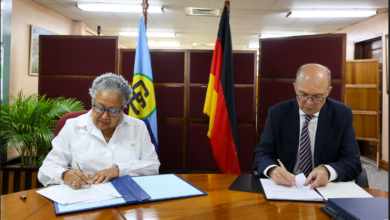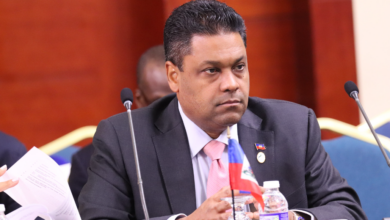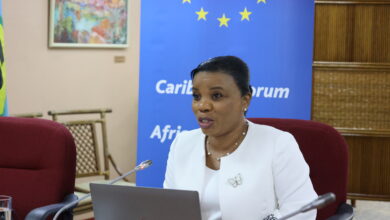|
Ministers, It is with extraordinary pleasure that I welcome you to this institutionally historic Joint Meeting of the Council for Trade and Economic Development (COTED) and the Council for Finance and Planning (COFAP) to establish the Programmes for the Removal of Restrictions on the Right of Establishment, Provision of Services and the Movement of Capital. It is my sincere hope that its achievement would likewise be historic. This day has been long in coming and has been looked forward to since July 1998, one year after the 1997 provisional application of Protocol II when the Programmes should have been established as provided for in the Protocol. This is a unique Meeting and a first for Joint Meetings of Councils. The Treaty (Protocol I) directs that Community Organs shall co-operate with each other for the achievement of Community objectives. More specifically, Protocol II gives COTED the responsibility in cooperation with the Council for Human and Social Development (COHSOD) and COFAP for the establishment of the Programmes for the Removal of Restrictions on the Right of Establishment and on the Provision of Services. COFAP, in collaboration with the Committee of Central Bank Governors has responsibility for the Removal of Restrictions on the Movement of Capital. The Councils have chosen this approach of Joint Meetings to meet their Treaty obligations. Tomorrow the COTED and the COHSOD meet in joint session to continue the process. My pleasure is further heightened by the fact that it was here in Grand Anse at the Conference Centre at this hotel in 1989 that the Conference of CARICOM Heads of Government took the landmark decision to establish a Single Market and Economy. It is apposite that we have returned to Grand Anse to make decisions which will introduce the new and defining elements of the CARICOM Single Market and Economy (CSME). Elements which add to the already existing single market for goods, thereby providing the single market for the provision of services and the movement of factors of production – capital and initially, agreed categories of persons. The Conference at its Twenty-Second Meeting in July, had reiterated that the establishment of these Programmes must be a priority for 2001. We now seem to be well on the way to achieving that 31 December 2001 target date. The road to this point has been rough in parts and has called upon all our creativity and our organisational and human resource capacity in particular. You would recall that the obligations of Member States under th Protocol first called for notification of existing restrictions, a standstill on the introduction of new restrictions and finally a roll back of existing restrictions. The first obligation highlighted for Member States many pieces of legislation, regulations and administrative practices which were often not in their consciousness. This exercise has fostered closer working relationships between the public and private sectors since all stakeholders needed to be involved. It has been forcing Member States to better understand their services sectors and the potential impact of liberalisation at the regional, hemispheric and global levels. Heads of Government have agreed that those restrictions which cannot immediately be removed should be removed by the end of 2005 at latest, when it is expected the Region would have to begin to face the increasing hemispheric competition, resulting from the anticipated establishment of the Free Trade Area of the Americas. It is obvious that the sooner we are able to establish our Single Market and Economy, the sooner we would have put ourselves in a better position to become more competitive and better able to face that competition. This is one of the main objectives of the CSME. The competition which we will face among ourselves as CARICOM partners, will be minimal compared with that which we will face from our North and Latin American FTAA competitors in our own and in our traditional markets. We therefore have to put in place our CSME arrangements early enough to have them work for us and put us in a most advantageous position possible to withstand that competition. It should therefore never be lost sight of that in this process, we are preparing not only to open up our markets to regional competition but also for meeting regional and increasing international competition. No less important than the issues of increasing competition are the possibilities for increasing competitiveness. Competition may have negative effects for some Member States, certainly for all Member States some of the time. Increasing competitiveness is positive for all Member States all of the time. Access to all of the Region’s human, financial, technological, intellectual and natural resources must be better than access just to our own individual national resources for achieving that necessary level of competitiveness. And this is what the CSME is seeking to provide for. We must make the mindshift of considering the entire Region as our horizon rather than just our geographic boundaries. Not to be forgotten also is our need to meet the eligibility requirements for benefitting from the provisions of the General Agreement of Trade in Services – the GATS – so that we are not compelled to extend to third countries the benefits which we give ourselves as a regional grouping. This means the coverage of our regime must be comprehensive. As Member States seek to comply with their Treaty obligations and commitments and remove cross-border restrictions, it is of course essential that the support and facilitating arrangements identified in our regime for Disadvantaged Countries, Regions and Sectors, in our Competition Policy and rules of competition and in our Disputes Procedures must be implemented. Our agriculture and industrial policies as outlined in the revised Treaty point to the requisites fo the development of competitive agriculture, industrial and services and transport sectors. These complement the provisions of Protocol II which provide new and innovative production opportunities using resources across borders and are important for realising the full benefits of the CSME. As we enter the implementation phase of the CSME, we must recognise the hard work of the Working Group established by the Conference to develop the proposals for the Programmes for the Removal of Restrictions on the Right of Establishment, the Provision of Services and the Movement of Capital. This Working Group, comprising public and private sector representatives, has taken into consideration, the guiding provisions of the Protocol and the criteria established by the Conference. Ministers, you now have before you as a result of their work, a set of recommendations for the Programmes, for your consideration before submission to the Conference of Heads of Government for its approval. I am sure that I have the support of all of us when I say we look forward to a productive meeting which results in the landmark achievement of seeing the CARICOM Single Market and Economy well on the road to implementation and making the difference. In closing, I wish to thank the Government of Grenada for taking on this monumental task of hosting this series of meetings. It could not have been an easy task given the number of meetings covering more than a week from Saturday to Saturday. I also wish to thank the officials for their hard work as we look forward to the rewards.
|
|
Press ReleasesSpeeches





